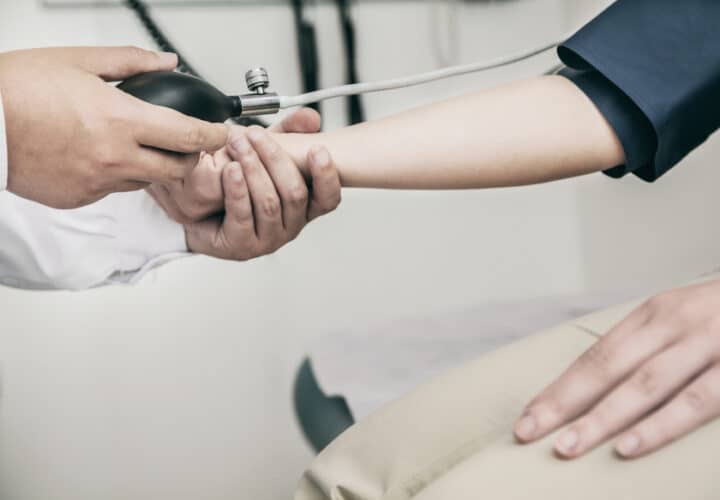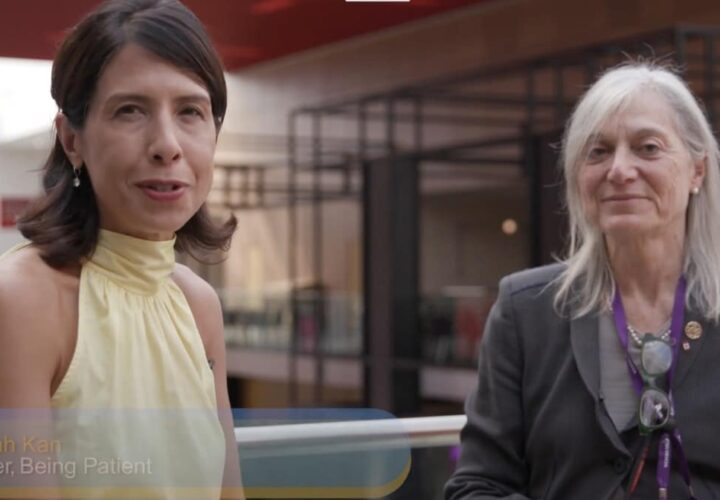December 6, 2017
Studies show that two-thirds of people with Alzheimer’s are women. To put that into perspective: By age 65, one in six women will develop Alzheimer’s over the remainder of her life—one in 11 develop breast cancer.
Why does Alzheimer’s target women? We asked two leading researchers in the field, Reisa Sperling, M.D., and Dorene Rentz, a neuropsychologist, of Brigham and Women’s Hospital. They said that researchers used to chalk up the higher numbers of dementia to the fact that women live longer, but new studies point out that a longer life does not account for the increase in risk.
- Women typically have a higher cognitive reserve than men, which means they’re able to hide decline by compensating for the damage of Alzheimer’s using other parts of the brain
- Women with an ApoE4 allele are particularly at risk
- Experts recommend only undergoing testing for risk factors in a clinical trial setting
Being Patient: What are the factors that scientists are looking at that seem to make women more susceptible?
Dr. Reisa Sperling: It’s been known for quite a long time that women are more likely to suffer from Alzheimer’s disease than men. Part of the issue is that women live longer. It’s only been recently that there have been really good studies that suggest, even when you account for longevity, that women are still more likely to decline faster. We’re looking at understanding whether that’s because women develop more of this amyloid plaque build-up in their brains. It doesn’t look like that so far. It looks like women may be more vulnerable for a given amount of amyloid, that they’re more likely to show more decline in their memory and their thinking abilities.
Being Patient: Some studies show that women sometimes had a greater cognitive reserve or didn’t show symptoms the way that men did, even though they might’ve had the same amount of amyloid.
Dr. Dorene Rentz: It’s well known in the aging studies that women tend to outperform men [on cognitive tests]. They outperform them in the perimenopausal phase, but then when they get to the menopausal phase, they tend to come up to the same grade as men. They do have a certain reserve for memory and verbal processing, particularly more than men do, which could contribute to the steeper decline later. Just in general, when you have a high cognitive reserve, you can maintain and have some protection until you reach a certain inflection point, at which you tend to decline much faster.
Dr. Reisa Sperling: It’s been brought up by several groups that if you use visual memory, or map reading or something else where men tend to actually excel over women earlier in life, you don’t see this disparate decline. One hypothesis is that women have farther to fall, but the other idea behind this reserve that Dr. Rentz was talking about is maybe women can hide their brain changes. By the time we pick them up, they’ve got more changes in their brain, and then unfortunately, they precipitously fall. But that’s exactly why these studies with imaging and sensitive cognitive tests are going to be so important to really understand why women decline faster.
Being Patient: So how are those studies being altered to more closely detect changes in women?
Dr. Reisa Sperling: Most aging studies have more women than men. We’re one of the only fields in which women are well represented, as opposed to many fields where actually men dominate. Women live longer and women are more likely to volunteer for these observational studies. In symptomatic Alzheimer’s trials, though, where people already have dementia, men and women are often in equal numbers even though women are much more likely to have dementia at that point. That suggests that women are more likely to be a caregiver—four times more likely. They’re more likely to bring in a male patient—their husband, their father—into these trials. For the A4 study, we worked very hard to have a representative group, and it’s 60 percent women and 40 percent men, which is exactly what it should be between 65 and 85. We monitored that all the way through to make sure we didn’t have an imbalance.
Being Patient: You mentioned hormones and menopause. How do we measure how hormones affect cognition and mind?
Dr. Dorene Rentz: In our studies there was a depletion in estradiol, [a form of estrogen produced by the ovaries], and that did have some impact on challenging tests of memory in women following menopause. You know, I think the answer is still out there somewhere. We don’t really know. We did try to find an answer; there was a huge estrogen trial because we thought that if you could boost estrogen in menopausal women, that you could prevent decline to dementia. That just wasn’t the case. In fact, it actually increased cardiovascular risk.
Dr. Reisa Sperling: And it increased risk of dementia overall. So in five trials, four of them have been in patients who already have symptoms of Alzheimer’s disease, and three of those four trials all showed that post-menopausal women on estrogen replacement did worse.
There have been some small studies now suggesting that maybe if you started estrogen during the perimenopausal phase, or during menopause, at least it wouldn’t be harmful, but no studies really, in my opinion, have shown a benefit. It’s unfortunately almost like there’s this biologic program in women that suggests that at a certain age of cell senescence or when hormonal changes are taking place, that even trying to override that is not protective, which is very disturbing. Even people like Roberta Brinton, a world expert in this, are now saying that this is evolutionary, which is very frightening and that it’s not clear how best we can overcome it.
Being Patient: For people who have had their ovaries taken out who are already on a hormone replacement therapy, how does that effect their brain health?
Dr. Reisa Sperling: In my opinion, those studies have not been very conclusive [about whether] there are risks or protective factors around taking replacement hormones for dementia. I really feel like this is an area that needs a lot of work. The one other thing around this is there’s a one common genetic risk factor for late onset Alzheimer’s disease: ApoE4. Almost all of the data suggests that it’s women with ApoE4 who are particularly at risk. I think that’s a hint that it may not just be hormonal, that it’s actually some interaction between sex and this genetic risk factor. That’s a clue.
Being Patient: Do you recommend getting tested for ApoE4?
Dr. Reisa Sperling: I recommend doing it in the setting of a clinical trial. I don’t recommend it for my patients. I have not been tested. There was someone who had this little handy-dandy, 10-minute tester at one of the booths and I was like, “I don’t want to know.” Because I wouldn’t do anything differently at this moment based on that knowledge. And the idea people misunderstand is that ApoE4 is a risk factor, but 40 percent of Alzheimer’s disease patients do not carry that allele and there are some ApoE4 carriers, even people have two copies of that gene, who make it to 85 and don’t develop dementia. It is not a deterministic gene.
Having said that, our data really do suggest that having an ApoE4 allele means you’re more likely to accumulate amyloid at an earlier age, and when prevention trials are here where that makes a difference to know your status, you can be tested in that setting. That makes sense to me. Someone responsible will tell you what it means and what it doesn’t mean. What I think is a little bit frightening is the 23andMe, where you get this little piece of paper saying you have this gene without any risk information. If you are a 23-year-old, what that information means for you versus somebody who’s 75 or 55, it’s different. I think that should happen in a controlled, careful setting, not on the web.
Dr. Dorene Rentz: In fact, I was at a meeting of the Alzheimer’s disease research centers in San Diego a couple of weeks ago, and they were discussing people coming into the clinic with their 23andMe findings. There was a woman there who said she went to 23andMe and she was really looking for a gene for breast cancer because that’s what she was worried about, and discovered that she had an ApoE4 allele and was devastated. The consensus of the group was that this knowledge should not be done without counseling. There should be pre-counseling as to why you want to get this information before you go ahead and get it, and then afterwards once you know the information.
Dr. Reisa Sperling: The same thing is true for amyloid testing in imaging or spinal fluid, because I think that’s increasingly becoming more of a question, and it may be more relevant for imminent decline than ApoE4. It should be done in a very careful setting. If you’re asymptomatic and you don’t have any problems at all, I think it really should be done in the setting of research so that we can offer people an opportunity to do something about amyloid rather than just worrying about it.
Being Patient: Would that be the same for the polygenic hazard risk that’s coming out?
Dr. Reisa Sperling: The polygenic risk is really interesting because I think at a population level, it is incredibly valuable to give us new insights into pathways and to help stratify risks. At this moment, even though we saw a lot of very intriguing data here, there is no evidence that an individualized polygenic hazard risk score has much predictive value above and beyond ApoE4 yet. I definitely don’t think we’re ready to have people get full genome sequencing. In the setting of research, it’s critically important because someday we will figure out not only the genes that are risk [factors], but most importantly, the protective genes.
So let’s say you’re a woman, you have two copies of an E4 allele, risk is getting pretty high, but maybe you’ve got one of those polygenic protective genes. I feel like this gene-gene interaction is definitely the way of the future.



